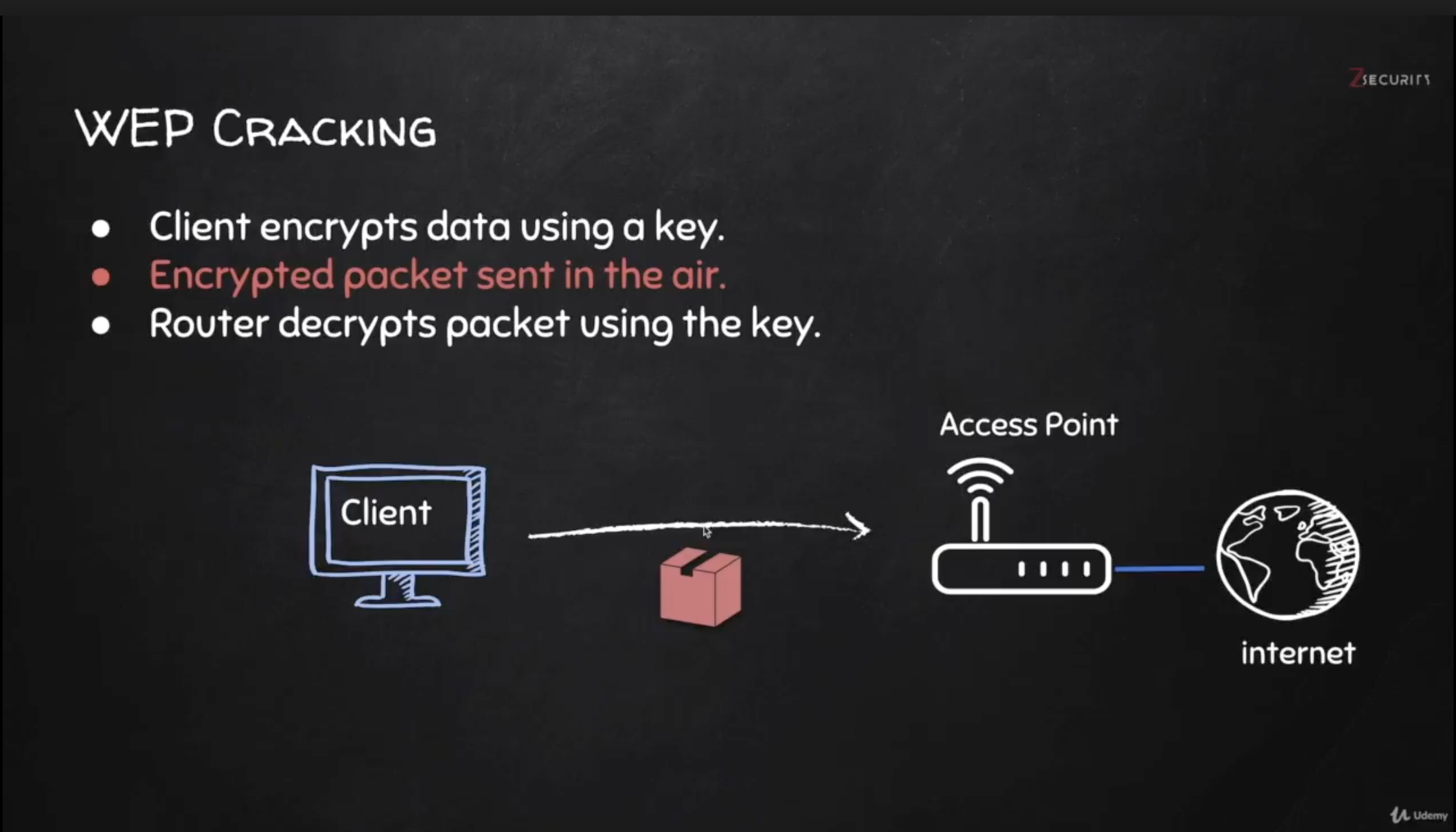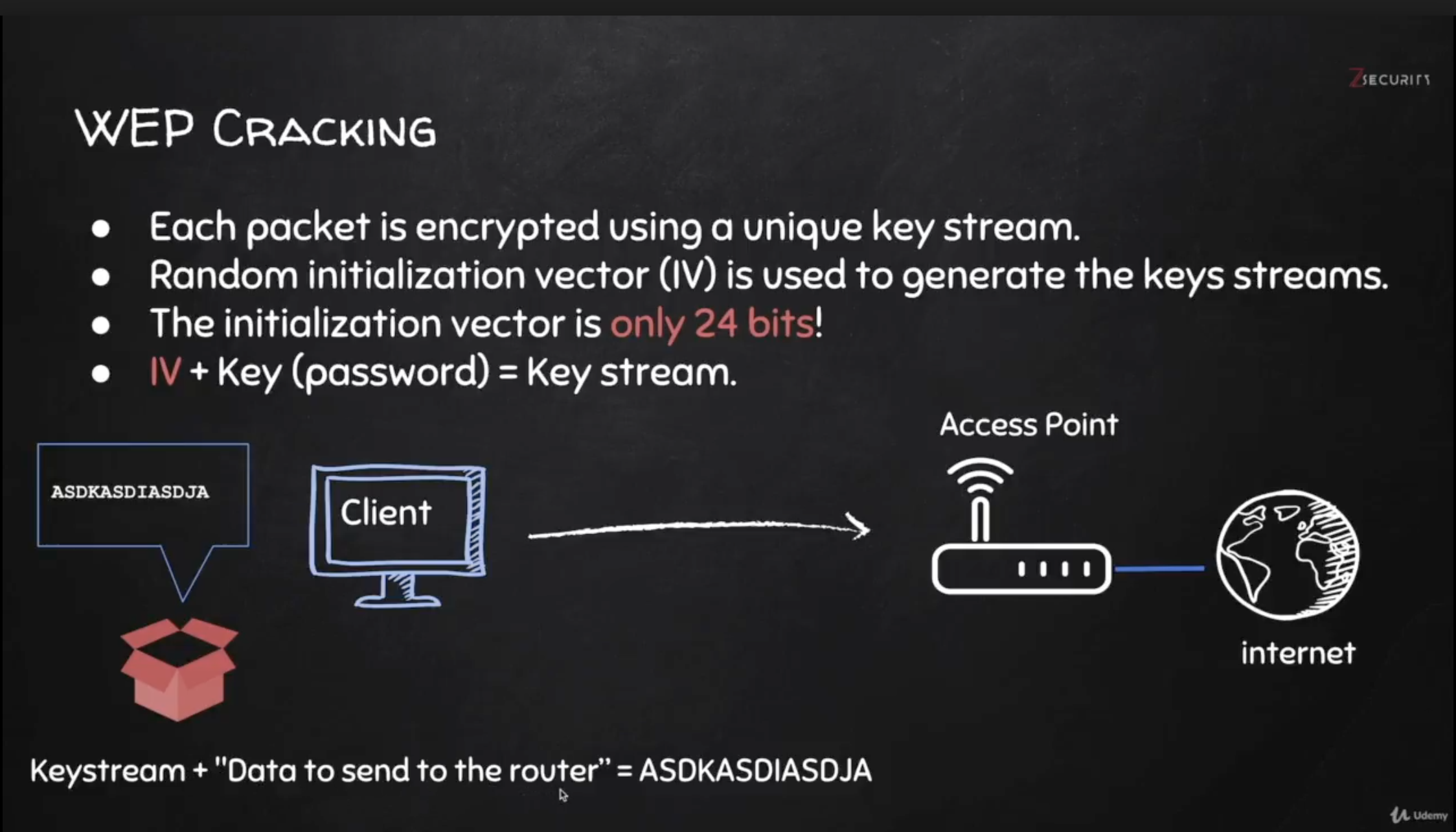WEP (Wired Equivalent Privacy) Cracking
- Old encryption
- Uses an algorithm called RS4
Workflow


- IV is too small.
- IV is sent in plain text.
- IVs will repeat on busy networks.
- This makes WEP vulnerable to statistical attacks.
Cracking
- Capture a large number of of packets/IVs.
- Analyse captured IVs and crack the key.
airodump-ng —bssid <bssid> —channel <channel> --write result <wlan interface> | Capture packets of network → write it to a file for anaylising |
|---|---|
aircrack-ng <xx.cap file> | Crack the key by using captured packets |
Fake Authentication
- If network is not busy.
- It would take some time to capture the IVs.
→ Force the AP to generate new IVs.
→ Associate with the AP before launching the attack.
aireplay-ng --fakeauth 0 -a <bssid network> -h <wireless adapter MAC> <wireless interface> | Force the network to add wireless adapter to the client (not yet connected) |
|---|
ARP Request Replay
- Wait for an ARP packet.
- Capture it, and replay it (retransmit it).
- This causes the AP to produce another packet with a new IV.
- Keep doing this till we have enough IVs to crack the key.
aireplay-ng --arpreplay 0 -b <bssid network> -h <wireless adapter MAC> <wireless interface> | Force network to create new IVs/packets. |
|---|
WPA / WPA2 Cracking
- Both can be cracked using the same method.
- Made to address the issues in WEP.
- Much more secure.
- Each packet is encrypted using a unique temporary key.
→ Packets contain no useful information.
WPS
- WPS is a feature that can be used with WPA & WPA2.
- Allows clients to connect without the password.
- Authentication is done using a 8 digit pin.
- 8 Digits is very small.
- We can try all possible pins in a relatively short time.
- Then the WPS pin can be used to compute the actual password.
Note: This only works if the router is configured not to use PBC (Push Button Authentication).
wash —-interface <wireless interface> | Scans nearby networks and lists only those that have WPS enabled |
|---|---|
reaver —-bssid <target router address> -—channel <channel> —-interface <wireless interface> -vvv —-no-associate | Sends WPS PIN guesses to the router without associate (use fake auth manually) |
Capturing The Handshake
Using airodump-ng write of a specific network and aireplay-ng —-deauth to capture the handshake
- The handshake does not contain data that helps recover the key.
- It contains data that can be used to check if a key is valid or not.
Creating A WordList
- Crunch can be used to create a wordlist.

- Wordlists links:
ftp://ftp.openwall.com/pub/wordlists/ http://www.openwall.com/mirrors/ https://github.com/danielmiessler/SecLists http://www.outpost9.com/files/WordLists.html http://www.vulnerabilityassessment.co.uk/passwords.htm http://packetstormsecurity.org/Crackers/wordlists/ http://www.ai.uga.edu/ftplib/natural-language/moby/ http://www.cotse.com/tools/wordlists1.htm http://www.cotse.com/tools/wordlists2.htm http://wordlist.sourceforge.net/
Cracking Using Wordlists
Two things needed to crack WPA/WPA2:
- 4-Way Handshake
- Wordlist